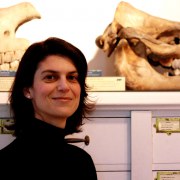Smartphones in museums: three case studies
Smartphones have become ubiquitous in our lives and their versatility offers great potential for visitors and museums. They can be used to deepen visitor engagement, personalise a visit, record visitors’ unique paths and where they spend time, provide alternative languages, and make the museum more accessible for visually impaired individuals.
This session will present museum case studies of context-aware mobile technology and will address the opportunities and challenges that lie ahead for such projects. Three panellists will share insights from their own smartphone projects, each currently at a different stage, from initial conceptualisation, to beta testing, to full scale launch and implementation. They will frame their presentations with the following questions:
- Why? (needs and goals)
- How? (technology, infrastructure, staff support)
- What? (content, user experience)
- And if applicable: what happened and lessons learned.
Facilitator
Associate Director Exhibit Content Development
San Francisco
United States
Session speakers
Andreas has been investigating the possibilities of responsive location aware smartphone devices in collaboration with startup company Mindtags, to integrate digital navigation and information in the Dialogue in the Dark experience. He will describe his goals for this technology in the context of the mission of Dialogue Social Enterprise and explain why he thinks this could be part of mitigating exclusion and promoting accessibility in accord with UNESCO’s “Information for All” program.
Bernd will share his experiences launching and maintaining the DASA museum multi media guide, based on Aviloc and devices given out to the visitors. It helps you find your way around the museum and provides additional content, especially tri-lingual texts and an audio track in easy language. Looking back on this major effort reveals plans that worked out fine and a few disillusioning surprises for the DASA team.
University College London
Theano will speak about the use of a state-of-the-art indoor location system (IndoorAtlas) to carry out visitor tracking in a museum gallery. This is part of a proof-of-concept study that used heat maps and analysed visitor paths to examine patterns of individual use as well as averages across. She will also discuss the pros and cons of using mobile technology for the collection of automatic location data in audience research as well as ethical issues.




